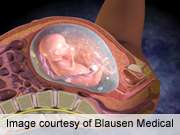(HealthDay)—While neonatal vitamin K refusal is rare, parents who refuse vitamin K are less likely to immunize their child, according to a study published online Aug. 18 in Pediatrics.
Vanita Sahni, from Alberta Health Surveillance and Assessment in Edmonton, Canada, and colleagues analyzed linked administrative health data on all infants born in Alberta between 2006 and 2012.
The researchers found that among the 282,378 children in the cohort, 99.7 percent had received vitamin K; the parents of 0.3 percent had declined vitamin K for their child. Vitamin K refusal was more likely associated with midwife-assisted deliveries, compared with physician-attended delivery (risk ratio, 8.4). Compared to hospital delivery, a planned home delivery (risk ratio, 4.9) or delivery in a birth center (risk ratio, 3.6) were more likely to result in decline of vitamin K. There was a higher relative risk (14.6) of having no recommended childhood vaccines at 15 months associated with vitamin K refusal.
"These findings enable earlier identification of high-risk parents and provide an opportunity to enact strategies to increase uptake of vitamin K and childhood immunizations," the authors write.
More information:
Abstract
Full Text (subscription or payment may be required)
Journal information: Pediatrics
Copyright © 2014 HealthDay. All rights reserved.





















